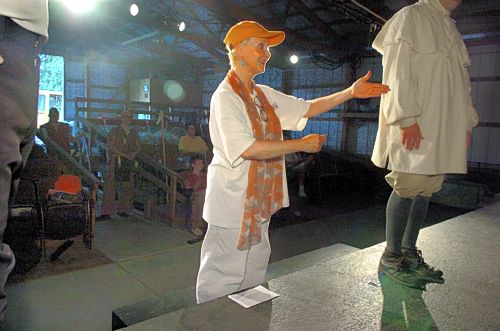
Rural Freeport Theatre Festival Finds Success Turning History into Drama

Marushka Steele directs actors in a dance scene in the play "Battle of Kittanning" set in 1756 and written by her husband Rennick Steele. Bill Wade/Post-Gazette
The brainchild of Rennick and Marushka Steele, the Freeport Theatre Festival in Allegheny Township is celebrating its 21st season this summer, an accomplishment by any standard.
But what makes its success even more significant is that, in these increasingly tough economic times for arts organizations, the Freeport Theatre Festival thrives by going against much of the conventional wisdom for successful small theaters.
Instead of concentrating on popular scripts, the festival specializes in history plays — often local history — and often written by Mr. Steele as well as other local playwrights.
The Steeles also chose to found the festival in a rural area, almost 45 minutes from Pittsburgh and its theatergoers. Their performance space, a converted machinery barn, sits on White Cloud Farm in Armstrong County, on land that has been in Mr. Steele’s family for generations.
Mrs. Steele attributes much of the success to the company’s focus on serving the people of the area. “We respect our audience, and they love history,” she said.
“Cauldron of Steel,” Mr. Steele’s play about immigrants in Vandergrift at the turn of the 20th century, is playing until July 25.
Starting Aug. 13 is the final play of the summer season, “Bertha and Bailey’s Circus,” a comedy also by Mr. Steele.
How Mr. Steele, who with Mrs. Steele was involved in New York City’s Off-Off-Broadway Alliance of the 1970s, decided to return to his family’s farm and found the Freeport Theatre Festival is another story that goes against expectations.
Mr. Steele lived on the farm until age 15, when his family relocated to Columbus, Ohio. He earned a bachelor’s degree in English from Ohio State University, served a stint in the Army and then moved to New York to become a professional actor and playwright.
“It was an exciting time,” said Mr. Steele of the 1970s, adding that the rules for mounting low-budget productions were much looser then, allowing him to produce several of his own plays with professional casts.
He met Mrs. Steele, then Marushka Dembecki, who had come from her hometown of Detroit to try her luck as a ballet dancer and as a professional actress. They married in 1980.
The Steeles left New York for Los Angeles in 1983, where Mr. Steele earned a master’s degree in education at the University of California at Los Angeles.
His father had returned to the family farm after his retirement and the Steeles joined the family there in the late 1980s. They founded the Freeport Theatre Festival in 1989.
Mr. Steele said he had found his family’s own long history in the area to be a rich source of inspiration for his plays.
Of Scotch-Irish background, the Steeles moved to the Hannas Town and Mount Pleasant area in the 1770s, later settling near Freeport.
Adjacent to the Steeles’ property is a cemetery dating from when a church stood nearby; the Steeles that are buried there “populate my plays,” Mr. Steele said.
For example, he said, “the town doctor in ‘Cauldron of Steel’ is my grandfather’s first cousin, whose stone is up there.”
In its early years, the festival concentrated on popular plays by known names, but in 1995, Mr. Steele presented a full-length play about a forebear of his mother’s, a Native American woman whose name was Nancy Ward.
“Beloved Woman” proved that historical drama could be a hit, and was the first of the festival productions to make use of historical re-enactors — people who take on roles of historical figures.
On June 17, Mr. Steele retired from his job as seventh grade teacher in the Armstrong School District, and he says he looks forward to dedicating even more time to the festival. The Steeles are both in their 60s.
Operating as a nonprofit, the festival is lucky in that it hasn’t yet had to raise ticket prices, Mrs Steele said.
“We break even. Three-quarters of our funds come from ticket sales, the rest from our corporate and individual sponsors.”
The couple is in the middle of a fundraising campaign to improve the performance space and add “real restrooms.”
The Steeles also plan a return to some of their more ambitious productions of the past, plays like “The Battle of Kittanning” that employed large casts, outdoor locations and even, on occasion, the farm’s horses and sheep.
“The Battle of Bushy Run will have its 250th anniversary in 2013,” noted Mrs. Steele. “My husband has said that in 2012, he’ll write a play about it.”
Bushy Run was an important 1763 battle during the French and Indian War that took place near Harrison City in Westmoreland County.
What has become clearer than ever over the years, said Mrs. Steele, is the power of both history and theater to remind us of our connections to our communities and each other.
“We’re all part of the same human family. And art helps us see that.”
Details: www.freeporttheatrefestival.org.
